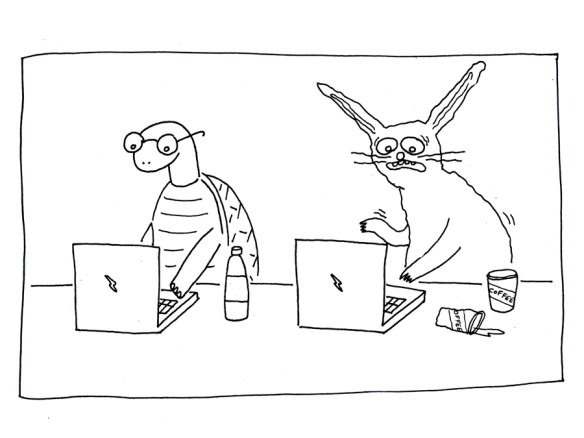 I am not naturally an organized person. I freely admit that I would rather pile things up – clothes, shoes, mail, email and especially paperwork. Why? In my mind, the act of taking time to put things away takes too much time!
I am not naturally an organized person. I freely admit that I would rather pile things up – clothes, shoes, mail, email and especially paperwork. Why? In my mind, the act of taking time to put things away takes too much time!
A couple of years ago, I was visiting my parents and watching the Baja 500 (a desert race on Mexico’s Baja California Peninsula) with my father. There was a fascinating segment where a team, that included a father and son, had gotten stuck due to some broken, but fixable, part of the vehicle. The son was frustrated with what had happened and was hurriedly working on the damage. In his haste, he kept making mistake after mistake. Patiently the father watched. After a little while, the father stepped toward the son, put his hand on his shoulder, and whispered, “slower is faster, son. Relax; concentrate; slow down.” The son did as his father instructed. I watched his shoulders relax, heard the deep breath he took and observed him consciously slowing down. He became methodical in his more relaxed state and no more mistakes were made. He repaired the vehicle much quicker and they were back in the race. It was a beautiful moment and I took away an exceptional business lesson. Slower is faster.
How can a businessperson apply the “slower is faster (SIF)” model in the everyday running of his or her business? Several ways. The most important method, and what I want to share with you today, is in the management of time and paperwork. This is especially true for a businessperson who handles his or her own calendar, record keeping, filing, etc. The solopreneur as well as the entrepreneur with a smaller staff definitely falls into this category.
The first thing to do is to wrap your head around the “SIF” mindset. While rushing sometimes gets us to the end of something quicker, there are inevitable and unavoidable mistakes. For example, have you ever hurriedly sent an email response to someone without proof-reading it? Most all of us have. However, I can tell you from experience, that when I am in a hurry and I don’t proof read that email, there are always mistakes in it. How does the “slower is faster” model apply here? Corrections! The recipient of the email may not understand what you wrote, the tone intended, need clarification, etc. In fact, one of my biggest mistakes in writing an email in a hurry is that I send it to the wrong person! I have 7 different “Karen’s” that come up when I type a “K” into the “to” line. If I don’t slow down and take the time to make sure the email is going to the correct “Karen”, I have sent a completely irrelevant email to the wrong person. Then, when the wrong “Karen” sends it back to me with a note, “wrong Karen, again”, I have to copy and paste the body of the email into a new note and make sure it goes to the right “Karen”, this time. I have wasted so much time by being in a hurry! Not only did the person who was supposed to get the email get it much later than I intended, but it took more time on my part to resend the email and then apologize to the wrong recipient. Consider, also, that doing things right the first time (the result of SIF) creates a more professional image and builds trust. Mistakes are unprofessional and could undermine confidence with clients and coworkers. Slower is faster.
Remember the SIF rule when dealing with paperwork, too. The idea is to touch each piece of paper one time – really – just once. The more times you handle something, the more time wasted. Think of that pile (or piles) of paperwork on your desk. Every time you pick it up to look through it for a particular piece, you have handled every piece in it, again. The trick is to DO something with the paper when it comes in. It’s okay to put it in a designated letter tray to file – now it’s out of the way and you don’t have to touch it again until you, or someone else, files it. However, items that need action need to be suspended in a dated file until it is time to DO something with them. It may seem that this system is slow and takes too much time, but it doesn’t. I can attest to the fact that slower, in this case, is definitely faster.
Today is a good day to begin taking action. First, start doing something with all that paper. File it, put it in a tray to be filed, suspend it, act on it or throw it away. You’ll be amazed how much time NOT going through piles of paper will save you. Next, slow down with emails. Check your recipients, watch what you forward, be careful when using “reply all” and proofread your copy. Finally, “slower is faster” can work in other areas of your life. I challenge you to think of times when this phrase can be useful and make it a part of living time-managed and well-balanced.






